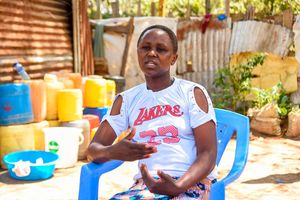
Recurrent vulvovaginal candidiasis is a chronic infection that affects all women globally, irrespective of race or background.
Paula* had had a terrible day. She was to take the afternoon off from work to come to the clinic. Unfortunately, a work emergency delayed her and she lost her time slot. But she was too uncomfortable to go home, and opted to wait for an opening.
The wait translated into a four-hour long wait that was killing her. When she finally came into the office, she was greatly frazzled. She was too tired for any niceties; she went straight to the point. I was the sixth gynaecologist she was visiting for the same problem. She was fed up and desperate for an actual solution.
Paula had been struggling with recurrent vaginal discharge and on and off vulval itching for the past year. The discharge was whitish, not offensive, and would come in cheese-like clumps. The moments of itchiness were so bad, sitting still was impossible. All she could look forward to was getting home and sitting in cool salty water to ease the discomfort.
At first, Paula, like majority of women suffering from vulvovaginal candidiasis, sought relief from over-the-counter medications; with the pharmacists and pharmacy technologists dispensing antifungal vaginal pessaries, creams and tablets. These medications provided relief, but as soon as her period showed up, she would have a fresh bout of symptoms.
After several recurrences, Paula decided to visit a gynaecologist. She was reviewed and given a different set of medications to take. She was comfortable for all of two months before the relapse set in. This became a repetitive cycle as every time she went to hospital, she saw a different gynaecologist who would prescribe a different brand of antifungals to no avail. The last one gave her expensive feminine hygiene products that did nothing to ease her discomfort; and boric acid vaginal pessaries, which worsened her soreness and irritation.
So, here she was, still in search of a solution; a permanent solution at that. Upon examination, Paula was genuinely in severe distress. Her vulval area was marked with fine pruritic marks, where she had lost the battle to the itch and allowed her nails to rake over the skin. The vulval skin was markedly hypopigmented, turning her otherwise ebony skin a raw pink, a clear sign of the chronic, long-standing nature of the problem. The labia were swollen and tender. A more invasive examination revealed plenty of cheese-like discharge in the vaginal canal, with reddish, inflamed vaginal walls and cervix.
Chronic infection
Recurrent vulvovaginal candidiasis is a chronic infection that affects all women globally, irrespective of race or background. It is quite a challenging condition to manage, and additionally, there are no local guidelines for care. Candidiasis is an infection caused by the fungus Candida albicans (C. albicans) and other forms of Candida that are not of albicans species. This fungus can affect the skin and mucous membranes, hence causes infection in the face, hands, scalp, mouth, throat, gastrointestinal tract, and genital tract.
The vaginal canal is not a sterile environment by any means. It harbours several bacterial species alongside the fungal Candida species. These micro-organists peacefully co-exist in the vagina as long as they are able to balance appropriately, ensuring that no individual species multiplies excessively to a point of causing symptoms. Once this balance is breached and the Candida species overgrows, the symptoms also kick in.
There are patients who are prone to recurrent vulvovaginal candidiasis due to their suppressed immune status. These include people with HIV, diabetes, and other immunosuppressive conditions; patients on antibiotics as they will destroy the vaginal balance by killing off the bacteria, leaving the Candida unchecked; those on long-standing steroid use such as transplant patients, patients with autoimmune conditions and those on cancer treatment.
However, a silent epidemic is creeping in, one of Candida resistance to the common antifungal medications we commonly use. The ease of access to over-the-counter antifungal medicines; inappropriate prescriptions, lack of adherence to prescribed duration of treatment; and need for repeated treatments are major contributing factors to drug resistance. Additionally, Candida albicans species is the most common variety causing infection and responding well to fluconazole, the commonest, most widely available and recommended first-line treatment antifungal in use. However, the non-albican varieties do not respond too well to fluconazole, with a need for higher dose, prolonged treatments.
As Paula had already been on pretty much all the commonly prescribed antifungals, it was time to change tact. We chose to take a specimen of Paula’s discharge to the lab for testing. The lab was not only able to isolate the offending Candida albicans, but gave us options of antifungal medication that were eligible to treat Paula with good response.
It has been a major relief for Paula to claim back her health. She had to take the medication for a month, which was quite costly for her; but it was worth it. The symptoms resolved and her shin tone slowly restored its normal colour. She could finally got back on track.
The horrible fungus had cost her a lot. She had to defer her Masters programme at the university because she was unable to attend exams during a particularly bad episode of the itching that would not allow her to sit still for a three-hour paper. This caused her career progression delay. Her sexual life suffered due to the extreme discomfort of coitus, causing a strain in their relationship.
Paula had not quite appreciated just how much this had impacted her psychologically. She constantly questioned herself, wondering what she was doing wrong. Her self esteem was down in the dumps and she had withdrawn from friends and family, always begging out of family functions and fun events with friends to go nurse her itchy vulva.
She even confessed how she had gone down the internet rabbit hole and tried all manner of non-medical remedies such as douching the vagina with garlic, using the infamous yoni pearls, and even applying yogurt in the vagina. All she had to show for it was turning the discharge intolerably smelly. At some point, she questioned her partner’s loyalty, wondering whether this was sexually transmissible, causing a massive strain in the relationship.
This nondescript little fungus can cause untold misery. It is time that we considered proper, evidence-informed candidiasis treatment guidelines as a country to stem the growing resistance patterns being documented.
Dr Bosire is a gynaecologist/obstetrician




